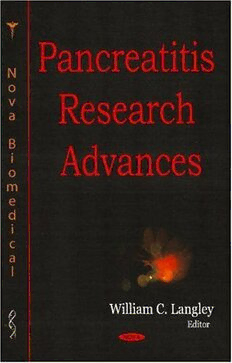
Pancreatitis Research Advances PDF
400 Pages·2007·13.556 MB·English
Most books are stored in the elastic cloud where traffic is expensive. For this reason, we have a limit on daily download.
Preview Pancreatitis Research Advances
Description:
Pancreatitis is an inflammation of the pancreas. The pancreas secretes digestive enzymes into the small intestine through a tube called the pancreatic duct. These enzymes help digest fats, proteins, and carbohydrates in food. The pancreas also releases the hormones insulin and glucagon into the bloodstream. These hormones help the body use the glucose it takes from food for energy. Normally, digestive enzymes do not become active until they reach the small intestine, where they begin digesting food. But if these enzymes become active inside the pancreas, they start 'digesting' the pancreas itself.Acute pancreatitis occurs suddenly and lasts for a short period of time and usually resolves. Chronic pancreatitis does not resolve itself and results in a slow destruction of the pancreas. In severe cases, bleeding, tissue damage, and infection may occur. Pseudocysts, accumulations of fluid and tissue debris, may also develop. And enzymes and toxins may enter the bloodstream, injuring the heart, lungs, and kidneys, or other organs. This new book presents the latest research from around the world in this field.
See more
The list of books you might like
Most books are stored in the elastic cloud where traffic is expensive. For this reason, we have a limit on daily download.
